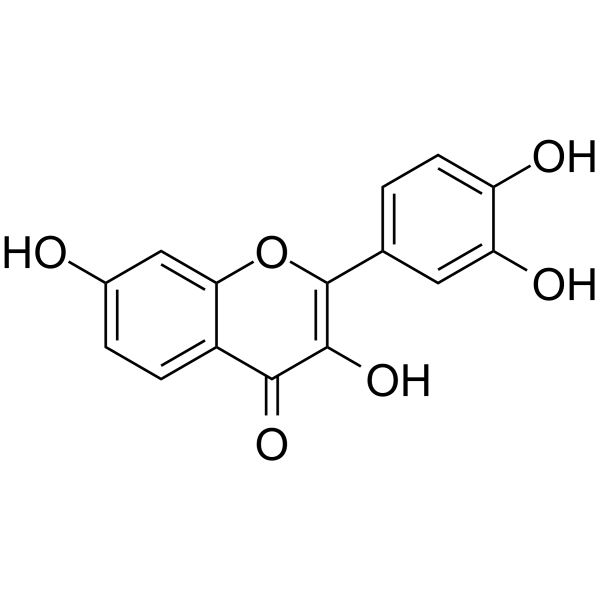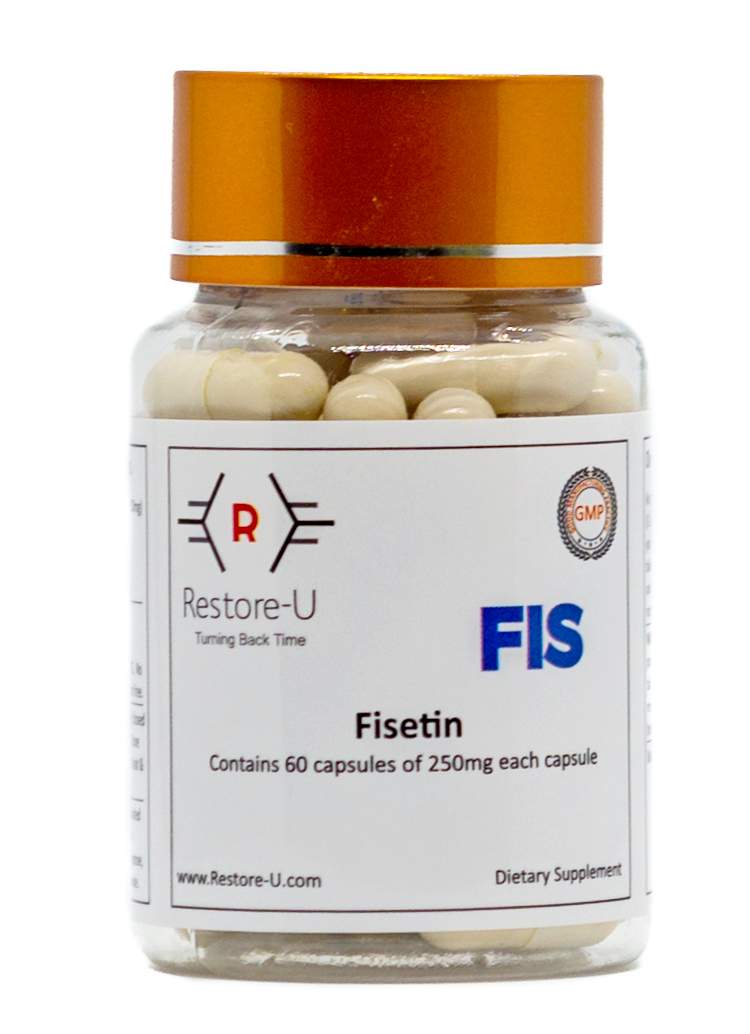

Fisetin is a plant polyphenol and part of the flavonoid group in the flavonol sub-category. Fisetin is a bioflavonoid antioxidant that can help maintain glutathione levels and mitochondrial function in the presence of oxidative stress.
Flavonoids are substances that give fruits and vegetables their bright colors (like yellow, orange and blue) and play a major role in conferring the health benefits that we get from eating more vegetables and fruits.
Fisetin is commonly found in many fruits and vegetables such as apples, persimmons, grapes, kiwis, strawberries, onions and cucumbers. In fact, the earliest record of isolated fisetin dates back to 1833 taken from the smoke bush (Rhus cotinus), so it has been around for a long time.
Flavonoids from dietary sources are the most sought after because of their safety and feasibility of oral administration.
It can be found in many common fruits and vegetables, although the amounts can vary considerably.
| Fruit/Vegetable | Amount (ml/g) | Fruit/Vegetable | Amount (ml/g) |
| Strawberry | 160.0 | Grape | 4.0 |
| Apple | 27.0 | Kiwi | 2.0 |
| Persimmon | 10.0 | Peach | 0.6 |
| Lotus Root | 5.8 | Cucumber | 0.1 |
| Onion | 5.0 |

Senescence is a process by which a cell ages and permanently stops dividing but does not die. Over time, large numbers of old (senescent) cells can build up in tissues throughout the body and usually occur over a few months. Senescent cell production rate increases with age due to accumulation of mutations, telomere damage and other factors triggering cell senescence. Senescence may play a role in the development of cancer and other diseases.
Recent studies found fisetin to be the most potent senolytic compound among a group of flavonoids that were tested.
Fisetin is the most potent senolytic and can increase lifespan. Fisetin has also shown the potential to fight multiple cancers, protect the brain from strokes, reduce inflammation, reduce seizures, support the immune system and fight many other diseases.
Karin O, Agrawal A, Porat Z, et al. Senescent cell turnover slows with age providing an explanation for the Gompertz law. Nat Commun. 2019 Dec 2;10(1):5495.
Senescence is a tumor suppressor mechanism activated in stressed cells to prevent replication of damaged DNA. Senescent cells (SC) have been demonstrated to play a causal role in driving aging and age-related diseases using genetic and pharmacologic approaches.
Of the 10 flavonoids tested, fisetin was the most potent senolytic. Acute or intermittent treatment of progeroid and old mice with fisetin reduced senescence markers in multiple tissues, consistent with a hit-and-run senolytic mechanism.
Fisetin reduced senescence in a subset of cells in murine and human adipose tissue, demonstrating cell-type specificity. Administration of fisetin to wild-type mice late in life restored tissue homeostasis, reduced age-related pathology, and extended median and maximum lifespan. The natural product fisetin has senotherapeutic activity in mice and in human tissues. Late life intervention was sufficient to yield a potent health benefit.
Because SC take weeks to reaccumulate, senolytics can be administered intermittently - a 'hit-and-run' approach.
In preclinical models, senolytics delay, prevent or alleviate frailty, cancers and cardiovascular, neuropsychiatric, liver, kidney, musculoskeletal, lung, eye, haematological, metabolic and skin disorders as well as complications of organ transplantation, radiation and cancer treatment.
In 3 month old mice, Senescent cells turnover every five days but take 25 days to turnover in 22-month-old mice. This model predicts a vicious cycle where senescent cells accumulate faster and are degraded (turned over) slower.
At the point of 30% senescent cell load animals often appear to reach tipping point resulting in death.
“Our results suggest that treatments that remove senescent cells can therefore have a double benefit: an immediate benefit from a reduced senescent cell load, and a longer term benefit from increased senescent cells removal.”
Fisetin extends lifespan in various organisms. Fisetin reduces the amount of senescent cells, which are cells that increase during aging and damage healthy surrounding cells, accelerating the aging process.
Whilst more often used for the above reasons, fisetin has also been shown to reduce depression, boost serotonin levels and boost hair growth. Fisetin has been shown to remove senescent cells, support reduction of inflammation, support the body in its fight against brain decline and cancer progression.
Getting enough fisetin from our diets is difficult, the most fisetin can be found in strawberries. One strawberry contains on average less than 2mg of fisetin. This means to get the same fisetin from your diet as you do from one serving of Restore-U Fisetin, the minimum you would have to eat is 350 strawberries!
Obesity leads to a skyrocketing risk of metabolic disorders such as type II diabetes. It also increases the risk for cardiovascular disease, cancer, dementia, and many other disorders.
Preclinical studies show that fisetin appears to act as a kind of “metabolism control switch,” reducing fat cell accumulation and suppressing activation of the protein mTOR, which is linked to weight gain. In mice fed a high-fat diet, fisetin prevented increase in body weight and accumulation of harmful white fat tissue.15
Fisetin also helped fight fat accumulation in the livers of animals fed a high-fat diet, a common occurrence with metabolic disease that can compromise liver function and lead to fatty liver disease.35-38
Fisetin may provide benefits for those already suffering from type II diabetes. In rodent models of diabetes, fisetin lowers body weight and leads to improved glucose control with lower hemoglobin A1c levels, a marker of blood sugar regulation over time.16,17
Poorly controlled diabetes often causes disabling or life-threatening complications throughout the body. In mice, fisetin significantly reduces the severity of diabetic complications, including slowing the progression of cataracts, preventing kidney damage, and improving kidney function.16,39
A human trial of fisetin’s ability to protect kidney function, particularly in diabetes patients, is currently underway.40
Cancer remains a major public health concern and a significant cause of death worldwide. Fisetin, a naturally occurring flavonoid, has been previously shown anti-proliferative, anti-cancer, neuroprotective, and antioxidant activities.
Dietary flavonoid fisetin has been shown in preclinical studies to inhibit cancer growth through alteration of cell cycle, inducing apoptosis, angiogenesis, invasion, and metastasis without causing any toxicity to normal cells. Although data from in-vitro and in-vivo studies look convincing, well-designed clinical trials in humans are needed to conclusively determine the efficacy across various cancers.
Fisetin has shown potential in preventing cancer and limiting the growth and spread of existing tumors in preclinical studies. Among its anti-cancer properties:
Myocardial infarction (MI) is a leading cause of death worldwide. Reperfusion is considered as an optimal therapy following cardiac ischemia. Fisetin is thus a highly promising candidate drug with clinical potential to protect from ischemic damage following Myocardial infarction (MI) and to overcome ischemia reperfusion injury (IRI).
People who suffer from a stroke are often treated with medication to dissolve the clot blocking blood flow to the brain. This can save a patient’s life, prevent damage to the brain, and even reverse the symptoms of stroke in some patients.
But ER doctors are working against the clock when treating acute (ischemic) stroke. The best chances of success occur when treatment begins within three hours of the onset of symptoms.41 Many people suffering a stroke are treated too late and suffer permanent neurological injury (and paralysis).
Studies show that combining clot-dissolving medication with fisetin significantly extends the treatment window.10
Patients receiving fisetin in addition to usual treatment up to five hours after a stroke had neurological outcomes as good as those treated within three hours. This extension of the therapeutic window means that many stroke victims who would otherwise suffer permanent loss of brain function have a better chance of recovery.
Fisetin has also shown neuroprotective benefits in animal models of Alzheimer’s disease, Amyotrophic Lateral Sclerosis, Parkinson’s disease and other brain pathologies, reducing the severity of disease and improving cognitive function.2,4-9
It is becoming increasingly clear that neurological diseases are multi-factorial involving disruptions in multiple cellular systems. Over the last few years, we have identified an orally active, novel neuroprotective and cognition-enhancing molecule, the flavonoid fisetin. Fisetin not only has direct antioxidant activity but it can also increase the intracellular levels of glutathione, the major intracellular antioxidant. Fisetin can also activate key neurotrophic factor signaling pathways. In addition, it has anti-inflammatory activity against microglial cells and inhibits the activity of lipoxygenases, thereby reducing the production of pro-inflammatory eicosanoids and their by-products.
Chronic inflammation is a prolonged and dysregulated immune response leading to a wide variety of physiological and pathological conditions such as neurological abnormalities, cardiovascular diseases, diabetes, obesity, pulmonary diseases, immunological diseases, cancers, and other life-threatening conditions.
Therefore, inhibition of persistent inflammation will reduce the risk of inflammation-associated chronic diseases.
Sirtuin proteins are another anti-aging target.24,25 These cellular protectors are found in all cells in the body, and are vital for keeping cells performing at peak level.
Sirtuin function tends to diminish with age. But fisetin activates sirtuin function in cells, countering this decline.26-30
In various animal models, sirtuin activation has been shown to extend lifespan significantly.24,25,31,32
Fisetin may protect against aging in other ways:
There is no evidence that fisetin would cause side effects, but no studies in humans have been conducted. There is no safety data for fisetin supplementation in humans, though no toxicity in animals has been reported.
However, clinical trial data is still quite limited in particular regarding long-term use. As always, if you do decide to take a fisetin supplement and experience any adverse effects, you should cease taking it immediately and consult your doctor.
Importantly, no adverse effects of fisetin have been reported, even when given at high doses. Thus, our results suggest that supplementation or even intermittent treatment with this safe, natural product could improve healthy aging, even in elderly individuals.
The amount of fisetin consumed in clinical trials vary greatly, with participants taking doses ranging from 100 milligrams per day to 1,400 milligrams daily. Recommendations on fisetin supplement labels vary as well, with doses ranging from 100–500 milligrams per day.
There is no safety data for fisetin supplementation in humans, though no toxicity in animals has been reported.
Two studies in Japanese women suggest an average daily intake of 400-800mg was safe; however, this was conducted from food surveys (Kimira et al, 1998; Arai et al, 2000).
Fisetin is a senotherapeutic that extends health and lifespan. https://www.ncbi.nlm.nih.gov/pmc/articles/PMC6197652/
Fisetin: A Dietary Antioxidant for Health Promotion. https://www.ncbi.nlm.nih.gov/pmc/articles/PMC3689181/
Some aspects of the in vivo neuroprotective capacity of flavonoids: bioavailability and structure-activity relationship. https://pubmed.ncbi.nlm.nih.gov/15639786/
Fisetin and Its Role in Chronic Diseases. https://link.springer.com/chapter/10.1007/978-3-319-41334-1_10
Antiepileptic effect of fisetin in iron-induced experimental model of traumatic epilepsy in rats in the light of electrophysiological, biochemical, and behavioral observations. https://pubmed.ncbi.nlm.nih.gov/27198489/
Fisetin provides antidepressant effects by activating the tropomyosin receptor kinase B signal pathway in mice. https://pubmed.ncbi.nlm.nih.gov/28945929/
The antidepressant-like effect of fisetin involves the serotonergic and noradrenergic system. https://pubmed.ncbi.nlm.nih.gov/22197297/
Fisetin, a dietary flavonoid, augments the anti-invasive and anti-metastatic potential of sorafenib in melanoma. https://www.ncbi.nlm.nih.gov/pmc/articles/PMC4811456/
Fisetin inhibits human melanoma cell growth through direct binding to p70S6K and mTOR: findings from 3-D melanoma skin equivalents and computational modelling. https://www.ncbi.nlm.nih.gov/pmc/articles/PMC4116133/
The Natural Flavonoid Fisetin Inhibits Cellular Proliferation of Hepatic, Colorectal, and Pancreatic Cancer Cells through Modulation of Multiple Signaling Pathways. https://www.ncbi.nlm.nih.gov/pmc/articles/PMC5215656/
Anti-cancer effects of fisetin on mammary carcinoma cells via regulation of the PI3K/Akt/mTOR pathway: In vitro and in vivo studies. https://www.ncbi.nlm.nih.gov/pmc/articles/PMC6034928/
Dietary flavonoid fisetin increases abundance of high-molecular-mass hyaluronan conferring resistance to prostate oncogenesis. https://www.ncbi.nlm.nih.gov/pmc/articles/PMC6276963/
Dietary flavonoid fisetin: a novel dual inhibitor of PI3K/Akt and mTOR for prostate cancer management. https://pubmed.ncbi.nlm.nih.gov/22842629/
Fisetin protects against cardiac cell death through reduction of ROS production and caspases activity. https://www.ncbi.nlm.nih.gov/pmc/articles/PMC7031222/
Dietary flavonoid fisetin for cancer prevention and treatment. https://www.ncbi.nlm.nih.gov/pmc/articles/PMC6261287/
Fisetin Acts on Multiple Pathways to Reduce the Impact of Age and Disease on CNS Function. https://www.ncbi.nlm.nih.gov/pmc/articles/PMC5527824/
The flavonoid fisetin as an anticancer agent targeting the growth signaling pathways. https://pubmed.ncbi.nlm.nih.gov/27377217/
Senolytic drugs: from discovery to translation. https://pubmed.ncbi.nlm.nih.gov/32686219/